I thought it might be helpful to readers to collate a number of tips and ideas all in the one place for convenience. Hope you find it useful. Please like and share.
1)How to tune your PA system
This is something a lot of folks have never heard of before, but it can make a huge difference to your overall sound. Use your system EQ to achieve a flat response and get rid of unwanted frequencies. There’s even an iPad app that helps you do this task pretty quickly. Check out my detailed post on how to tune your PA system by yourself.
2)How to do a sound check
Taking the time to do a sound check might seem obvious, but so often I see people take shortcuts and don’t give adequate time to this or don’t do a thorough check. Read more about church sound checks at my in-depth post.
3)Building a PA system from scratch
For many churches, the best option will be to outsource sound design and installation, but others may have the technical knowledge in house to build their own system. If that’s the route you wish to take there are a lot of different things you need to consider. Check out this resource on how to build a PA system from scratch.
4)Record the worship services
If you already have a great PA in place, there are a number of ways to record your worship services. You could record direct to disk, via laptop or to CD recorder. Also if you don’t have facilities to do that, there are other ways to record using handheld digital recorders that give good results. Read more about recording church services here.
5)Upgrade your current PA
Does your current setup need a full or partial upgrade? What do you need to do to make your system better? Sometimes with just a few bits of added gear or replacements, you can take an average system and make it into a great system. Take time to learn all you can and see where a church pa system upgrade could make a difference. Check out some of the other articles on our site for ideas.
6)Make recordings anywhere
Perhaps at the moment, you record the worship service to a laptop, but what if you want to record the kid’s worship, or a meeting, or conference session, do an interview or even record outdoors? A laptop isn’t very practical for that, but there are lightweight portable recording devices that do this job very well.
7)Get the best out of your church audio setup
Ok so you have church audio, and you maybe don’t have money for a big upgrade. So how do you get the best out of what you already have? Believe it or not, there are probably things you can do to make it better with just a bit of thought and time.
8)Build your own sound booth
Even if you are using contractors to install your sound system, this is something that you should be able to do with some help from technically minded folks in your church, or those with some joinery skills. Figure out what you need, think carefully about dimensions and look at what others have done. Why reinvent the wheel? I have another post you might want to check out – 9 Church Sound Booth Ideas, Designs and Layouts(with pictures).
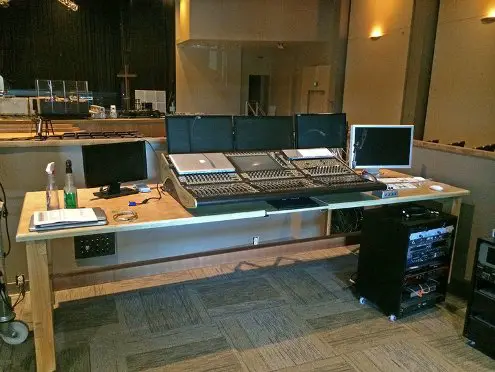
9)Use quality microphones
Everyone has different views on what the most important part of any PA setup should be, but for me, microphones are up there in the top 3. It doesn’t matter if you have a $20k sound system and you are using $30 microphones, you are going to get poor results. For quality vocals, you need to spend money on quality vocal microphones.
10)Doing church PA on a tight budget
The vast majority of churches around the world are small church with under 100 in attendance on a Sunday. That usually means there isn’t a whole ton of money to use on sound equipment, so it makes it even more important to figure out how to build a good PA system on a tight budget.
11)Use comfortable chairs for your sound booth
Workspaces and offices these days are required by law to comply with chair regulations for workers where they are sitting at a desk for many hours. A comfortable and adjustable chair is important for general spine and muscle health, why should it be any different for church volunteers. Make sure you have decent chairs for your audio desk team.
12)How to position loudspeakers
If building an audio system, you will need to give careful consideration of how to arrange speakers in a church. In certain situations where you use contractors to do your sound, you won’t need to worry about this, but if doing your own sound, speaker placement can make a world of difference to overall quality.
13)Build a sound tech team
If you have a new sound desk and PA setup, you’re going to need a good team to get the best out of it. Take time and care when choosing team members, offer training and continual support. You may find this more in-depth post on how to build a church tech team and develop a training program.
14)Use trunking to keep cables tidy
With lots of cable lying around, they can be a trip hazard and accident just waiting to happen. Make sure you have your cables that are tavelling long distances within the church inside plastic trunking. It’s relatively inexpensive and simple to install – click here to check price on Amazon
15)Analog mixer ideas
There are so many mixers to choose from when building a PA, how do you know which is the right one for what you need? Digital mixers are becoming more popular, but analogue mixers are still widely used. I personally prefer analogue mixers, but that’s just me, you need to figure out what you need. I have written a few posts to help with that. Check out my comparison post Analog mixers vs digital mixers.
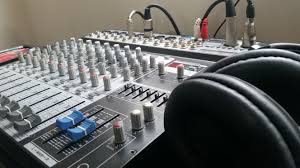
16)Sound tech ideas for smaller churches
Most of the audio blogs that are out there assume that everyone is in a megachurch and tons of money to spend, but most church are actually small churches. That’s why so much of my website caters to those with questions about sound for smaller size churches. Check out my other posts on this site that are directly relevant to smaller churches.
17)Monitor headphone ideas
A quality set of monitor headphones are important for getting a good sound mix, especially when sitting monitor levels. There are so many models out there, how do you know which is right for this application. I have created a small list of mixing headphones that I consider among the best.
18)Small mixer ideas
Most churches will have smaller hall areas with a need for sound of some kind. For these applications, you don’t need a 32 channel desk or anything like it, when a small mixer will do the job fine. One mixer I recommend are the Mackie PROFX4V2, a small 4 channel mixer with a lot of features packed into a small space, you can read a bit more about it on this post about PA systems for small churches.
19)Always have plenty DI boxes
You can never have enough DI boxes can you? If you have been running a sound board for a while, you will know this is true. For guitars, keyboards, bass if you aren’t miking up separate guitar amps, you will need to use a DI box for each instrument. I always have a big box of them with plenty of spares.
20)Acoustic instrument mic ideas
Acoustic instruments such as flutes, violins and acoustic guitars require special types of microphones to reproduce the signal well. You can get away with a vocal mic, but the results won’t be very good. Directional cardioid mics are good for acoustic instruments, also an alternative could be a clip-on wireless microphone. Handy for instruments that move around when they are being played. The AKG C1000 and Shure SM57Beta are two that I use on a regular basis. You might also be interested in my post on mixing acoustic guitar.
21)System EQ ideas
Having a system EQ unit can help eliminate feedback and unwanted frequencies from your sound mix – read more about mic feedback. If using powered speakers, the EQ unit goes between the mixer and speakers. If using a separate power amp, the EQ unit goes between the mixer and the power amp. To find out more about PA system EQ, you should read my other post on this topic .
22)Mic up the drum kit
If your church sanctuary is medium to large in size, you should probably think about miking up the drum kit. In a smaller building you will be able to hear the cymbals and hi-hat quite well, but in a larger building, the sound just won’t carry the same. By using microphones, you will end up with a much more balanced sound. You should read my post that covers the Shure drum microphone kit.
23)Consider a drum kit screen/shield
I’m generally not a big fan of drum screens from an aesthetic point of view, as it seems to me to give out a signal that a drum it on it’s own is just too wild for church and that church music needs to be sanitized in some way. Having said that, in a smaller church building, it can be a useful way to control volume level, as the drum kit even un-miked will often be much louder than the rest of the band. By using a drum shield in your church and miking up the drum kit, it gives more control over the volume.
24)Use quality XLR patch cables
I can’t emphasise this one enough through my own experience. I’ve bought cheap patch cables and then a few weeks down the line, begin to wonder where the hum is coming from. Save yourself time, money and headaches by just buying quality XLR patch cables and instrument cables from the word go.
25)Mic stand ideas
I know this seems a bit obvious. Isn’t there just one type of mic stand? Well no there isn’t. Don’t feel constrained to just the one design. There are a number of different types and sizes of stand out there for all types of configuration. You can get short stands that are better suited for a bass drum or for guitar amps. You can get stands that are weight balanced for miking up cymbals, so they don’t fall over. There are desktop stands and lectern stands too. Look around and see which microphone stand would work best for each application.
26)Record a service direct to laptop/pc
If recording the service or even just the sermon, you don’t need expensive equipment to do this. In fact you can do it with just a laptop and a USB audio interface and get some pretty good results. Just make sure you have enough storage space for the audio files or even use an external hard drive for this purpose. Check out my post on how to record a church service here.
27)In-ear monitoring
In-ear monitors have been around for a while now, but becoming more popular for secular music shows and also in churches. A couple of advantages of using in-ear monitor systems for churches are that you aren’t tripping over floor monitor speakers and each musician/singer can have their own mix.
28)Consider active powered loudspeakers
Active powered speakers compared with passive speakers are usually more expensive, but they do have some advantages. One, you don’t need a power amp as part of your set up, you just connect direct from your mixing desk. Two, if you get good quality speakers, the built-in amp will be closely tuned to work well with the loudspeaker.
29)Use a quality snake cable
When you lay down a snake cable, it may have to go under the floor and then on the stage area you may need to build into a floor or wall fixing/hatch. The last thing you want to do is to have to take it all out again looking for a dodgy wire connection that might be causing sound problems. Use a high-quality audio snake to avoid these kinds of problems.
30)Borrow from other churches
If you are just starting out and don’t have the money to buy all the gear you need, why not ask around some other church and see what gear they aren’t using. Larger churches may have some older gear or even stuff they have for standby they might be willing to lend for a period of time. Could save you a few $$.
31)Plan for the future
It always a wise thing to try and future proof a sound system as far as possible. Audio technology doesn’t change as frequently as other types of technology, so if you buy the right gear at the right time, it should remain up to date and practical for a few years to come. Try and assess what technologies are on their way out, or what is trending, also what is tried and tested and still in use today. Think of the Shure SM58, still one of the most popular microphones today, yet it came out 50 years ago.
32)Keep a look out for quality used gear
You can save yourself quite a bit of money with used gear, even if it is only a small part of your setup. Used audio gear can be a great way to get some really great quality equipment that you wouldn’t be able to normally afford.
33)Floor/stage monitors
Floor monitors are a must(unless you are using in-ear monitors). They enable all the musicians and singers in your band to be able to hear one another. These come in both passive and active types. You can have as many individually controlled monitors as your sound desk outputs will support, but I would recommend a bear minimum of 2 for even the smallest of setups. If your desk doesn’t support more monitors than you need, you can chain them together, although you do lose some control. You may be interested in my other post about stage floor monitors.
34)Active vs passive speakers
Passive loudspeakers have no power going to them, and therefore no amplifier. They are powered directly from a powered mixer or power amp. Active speakers have a built-in amplifier and are therefore powered speakers. You do not require a power amp or a powered mixer to use them.
35)Using contractors and audio consultants
If you are doing a major sound installation and you have a decent budget, it may be wise to bring in professional audio contractors to do the work for you. This does come at a price, but that is something that each church will need to assess.
36)Always have various lengths of patch cables available
You can never have enough patch cables because you will inevitably have broken cables, noisy cables, missing cables etc. from time to time. Keep a box filled with all types, XLR, 1/4 jack, adapters, 1/8 jack, short leads, long leads etc.
37)Consider a wireless guitar system
I play guitar, so I know what a nuisance cables can be. Many professional bands now use a wireless system for their guitars where the guitarist has a small radio pack attached to the guitar strap usually, which then connects to the output jack on the guitar. It’s a neat and tidy solution if your budget can cover this.
38)Safety first when hanging speakers
When you are installing loudspeakers it is very important that you make the safety of the congregation your first priority. A heavy loudspeaker falling on someone has the potential to kill! If you are fitting bracket to a wall, you may have skilled tradesmen within the congregation who could do a safe installation. However, if you are hanging speakers from cables or you are in anyway unsure what you are doing, I would strongly advise getting professional contractors in to do this work.
39)Make sure you have enough power points
When installing a new system, you can get so focussed on all the tech and other stuff that you forget about how you are going to power it. You will have quite a lot of equipment that will need access to mains power. Get an electrician to check that the power points are going to be adequate and if you are getting a sound booth built, make sure that adequate power provision is built into the design.
40)Radio/wireless microphone systems
Some churches use fixed podium or pulpit mics, but one disadvantage is that when the preacher moves about the volume goes up and down. This is where radio or wireless mics are a great solution. They allow the preacher to move about a bit without loss of volume. There are also no cables to potentially trip over too. It is also worthwhile having a few roving wireless mics for doing things like interviews or allowing the congregation to ask questions. If you have the budget, you can also get wireless systems for guitars too.
41)Floor monitors active or passive?
Stage floor monitors are essential for musicians and singers to be able to hear one another. For small stage areas, you would need two monitors at a minimum. For larger areas, maybe four. You also need to check how many individual monitors your sound mixer will support – read about amps for IEMs. Active monitors have built in amplifiers, so you can tweak the volume on the individual monitor. Passive monitors have no amplification built in – once you max out volume from the desk output, you can’t make them any louder. See my other post about floor monitors to find out more.
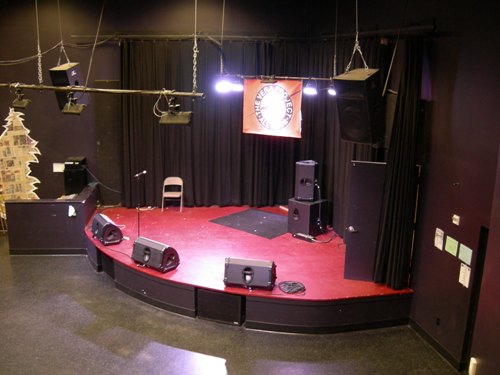
42)Sound booth lights
If you have been on the sound desk for an evening event when light is low, or if the lighting is turned down in the sanctuary, you will know how hard it is to see what you are doing. It is well worth getting a light for your sound booth that can easily be moved out of the way when you don’t need it. I personally use a couple of USB powered flexible LED lights that I can point down directly on to the desk without the light bothering anyone during a service or concert.
43)Are your batteries charged?
You’ve done your sound check, everything seems fine, until halfway through the worship, someone’s radio mic goes down, or a guitarist’s active pickup circuit stops working because the batteries have gone flat. Don’t get caught short, check all batteries before you start, and always have a supply of new batteries of various sizes for emergencies.
44)Make your own labels
When putting together a PA sound system, there are so many different parts, that to keep tabs on everything, you will need to label all your equipment clearly. A great way to do this is to use your own labelling machine, which will probably get plenty of use as over time, labels get lost or you change up your system. The Brady BMP21 is a label maker recommended for many different applications.
45)Loop amplifiers
The need for a loop amplifier in a church has pretty much been superceded by more people using digital hearing aids. However, there are still a sizable number of people using analogue hearing aids. A loop amplifier receives an audio signal from a mixing desk and then transmits a radio signal throughout a building which can be picked up with a hearing aid.
46)Keep things tidy with a 19″ rack
A 19″ rack is a great way to organise your sound gear. Many types of equipment such as power amps and equalisers are designed to be installed in a 19″ rack, but many smaller pieces of equipment have rack mount kits available so they can be adapted.
47)Organise training for your team
Team training is essential for any sound to ensure a good experience for all. You could organise your own internal training as well as maybe take your team to national or regional training events.
48)Digital mixer ideas
Digital mixers are a great option for churches at the moment as they are crammed with many features, but without taking up more space. It is also possible to save your settings for different songs and playlists which is a great bonus. Check out my other post about budget Mixers for smaller sanctuaries.
49)Digital snakes
Digital snakes are a fairly new technology and are the digital equivalent of an analogue XLR snake cable. A traditional snake is usually made up using a multicore cable, XLR plugs at one end to connect to a mixer and XLR sockets at the other end to connect to microphones and instruments. A digital audio snake simply converts the analogue signal at both ends into a digital signal which is transmitted along a cable. The advantage of this is that the cable is much lighter and easier to install than an analogue cable.
50)Lectern microphones
A lectern microphone can be useful if you require a fixed microphone for a pulpit or lectern. They usually come with a flexible arm which can be moved to point directly towards the person speaking.
51)Attend a church audio conference
In certain parts of the country, there are annual conferences for those doing church audio. This could be a great resource for any church tech team and possibility for training.
52)Portable audio system ideas for church plants
For those who have planted a church, you will be familiar which having to set up and tear down for worship each Sunday if you hire a hall or schoolroom for worship services. One important factor in deciding on a sound system in these situations is portability. You want your sound quality to be as good as possible, but you also want to be able to set up and tear down in a reasonable time period. Check out my other post on mobile Sound Systems
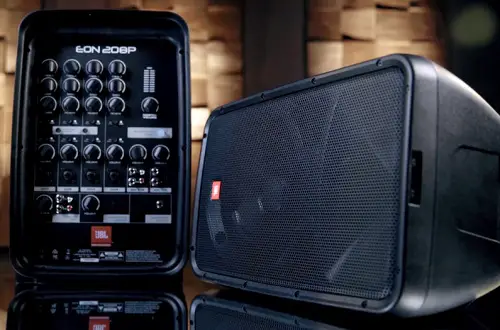
53)Run sound to other rooms
If your church building has many different rooms for childcare, Sunday School and youth groups, you may wish to run sound to these room during the worship service. This allows those volunteers who can’t stay for the remainder of the service to listen in while in another room. You can do this by running an aux output from your mixing console to some speakers in adjacent rooms, or you could even do this wirelessly.
54)Dealing with church leadership
Remember to keep communications open with church leadership when planning sound for weekend services. If you need to change anything or need to buy more gear, you will probably need to work with the church leadership to get changes approved. Also, be prepared to listen to honest criticism so that you can provide the best sound experience for everyone.
55)Pray with your team
If you lead a sound team, remember to pray together. Doing the sound is a ministry of the church and enables people to worship together and hear the word of God preached. Don’t undervalue what you do and ask God to help you to do your best to his glory and praise.
56)Attend worship band rehearsals
If you have a worship band, they will probably have a regular rehearsal night. If you have a sizable team, then you might be able to organise for one of your team to work the mixer every week for rehearsals. If you are on your own and it is a smaller setup, then try and be there when you can. That time spent with the band/choir can often iron out quite a few problems before you get to Sunday morning.
57)Lapel mics or over ear?
What kind of mics will you use for the preacher? Lapel or over ear? I think the answer to this might partly be personal preference. I personally prefer lapel mics, but over ear mics are perhaps less susceptible to rustling when the preacher/speaker is moving about.
58)Dealing with complaints
When running sound, it is inevitable at some point that you are going to receive some complaints from folks in the congregation. Listen carefully to what people are telling you, respond graciously and with humility even if you think they are wrong. Maybe write down what has been said so you can discuss it with the rest of your team. You might want to read my post on this subject – how to deal with complaints that church music is too loud.
59)Audio processing software ideas
If you are recording services direct to disk on a PC or Mac you will need some audio processing software. There are some basic free tools such as Audacity which has quite a lot of features, but if you want a paid tool, then packages such as Logic Pro and Cubase Audio are high quality programs.
60)Get all your gear PAT tested
With so much electrical gear plugged into your mains supply, it is worth getting all your cables and equipment safety checked once a year. If you have a lot of gear, it may be worth buying your own PAT tester, although they can be quite pricey.
61)Consider running your own in-house training videos
If you do team training, why not consider video recording your training sessions. This means than when a new member of the team joins, rather than repeating a particular training session for one person, you can refer them to the video training. Rather than some generic training, it will be specific to your sound system.
62)Running sound for a drama production
Occasionally you may be asked to run sound for a play, drama production or skit for a youth outreach. These type of events can be quite a challenge as the actors involved will tend to move around a lot, so plenty of opportunity for feedback. Also you may need to set up more radion mics than you would normally use. Make sure you get a chance to have a rehearsal with the drama group before the event. If sound effects are required, you may find my paragraph below on the Novation Launchpad interesting.
63)Novation Launchpad for multiple sound effects
If you need sound effects for a drama skit or youth outreach, the Novation Launchpad is a great bit of gear. I just bought one recently and it has been amazing. It runs with Ableton Live software and you can use it to launch sound clips from pre-programmable buttons. This could be very useful during a drama skit for sound effects.
64)Have a copy of the running order
The number one sin of a sound technician is not having a copy of the running order! You will need to know exactly what is happening in the service and you may have different mixer setting for different songs or parts of the service or event. If you have the chance to attend a rehearsal beforehand, write down your settings for various elements coming up, so that you will able to find them easily on the Sunday morning.
65)Be prepared for emergencies
You can rest assured that when running sound for church, there will occasionally be emergencies and mishaps. You should plan as best as you can for these things. Always have a box handy with batteries, duck tape, a spare radio mic all ready to go.
66)Get to know your mixing console
If you are doing the audio for church every week, you probably don’t have a lot of time to really get to know your mixing desk well. It could prove invaluable to get to know your mixing desk better and explore all the various functions available. Why not organise for one of your musicians to come down one evening to play/sing and just allow you to experiment with the settings on your mixing console.
67)Podcast the services and sermons
Many churches now either live stream or podcast services or sermons, but how do you start? What gear do you need? There are a number of podcast hosting providers out there, some free and some paid. Do some research for what is best for you.
68)Setting up microphones for a choir
Church choirs require a particular setup for microphones for either live sound or recording. You are best using condenser mics for choirs rather than dynamic mics. Also, use high boom stands so that the microphones can be directed down towards the choir and pick up the voices of all the singers rather than just a few.
69)Don’t forget insurance
Most churches will have insurance for the contents of their building, and it may or may not include all the sound gear. It is worth checking this with the church treasurer. If you are working in a church plant and rent your facilities you may not be insured at all. It is worth getting insurance against theft, fore and water damage just in case.
70)Have plenty of spare cables of all types
There is absolutely no doubt that cables and connectors are going to break on a regular basis. Always have some spares of various lengths and connector types handy for emergencies. You won’t regret it.
71)Learn to repair your cables
As well as having spares for emergencies, learning to repair your cables is an invaluable skill to have. It’s not a particularly difficult job and will save you quite a bit of money in the end. All you will need is a soldering iron station, some solder, spare connectors and cutters for stripping wire.
72)Don’t let mice ruin your audio system
This may seem a strange thing to add to this list, but you wouldn’t believe how many faults in church audio systems can be traced to mice activity. If you suspect mice are knawing at your cabling, put down some traps near the problem areas and see what turns up. If you do find mice, you could put some poison in a trap to infect the nest, or if you prefer a more humane way of dealing with the problem you could lay down some live traps and release the mice far away from the church.
73)Communicate with the worship band
When running the sound mixer and in the midst of a worship set, it can be difficult to communicate effectively with the worship band or preacher. You could come up with a set of hand signals that is commonly understood by your team and the musicians, or if you prefer something a bit more discrete, you could set up a way of communicating between front of house and stage involving buttons and lights. Another way could be to use a communications app via mobile phone, although this could be a bit fiddly to use in the middle of a worship set.
74)Doing sound for video clips
Some churches that use a data projector or screens may show video clips from time to time or maybe have a film evening. It’s important that everyone can hear the audio clearly as well as watch the videos, so it is important to have a run through of the video beforehand and check sound clarity and volume levels. If running from a laptop, just be aware that some computers don’t have quality audio outputs. If you think this to be the case, it might be worth investing in a USB audio interface to enhance the sound. You can also run sound from a DVD player direct through the mixing console, which in some cases may guarantee better quality audio.
75)Soundcraft training videos – a little known secret
Here is a little known secret if you want to improve your knowledge of mixing consoles, Soundcraft has a fantastic set of training videos for UI and SI consoles. Even if you don’t have one of these consoles, the information provided in these videos could prove very helpful. You can find the Soundcraft videos here.
76)Make an inventory
Do you know all the gear you have at any one time? This is often required by insurance companies, but could also prove useful to other members of your team. Also if you ever decide to retire or move on to another church, it means that there is a record of what equipment you have.
77)Get a great toolbox and have it ready always
A sound technician should always have a toolbox nearby. A good set of screwdrivers(large and precision), electrical tape, pliers, cutters and can form the basis of a decent toolbox. You will learn over time what kind of tools will be useful to have around.
78)Use a UPS for desktop PC, monitor screens and some of your audio gear
If you also do the data projection as well as running audio and using a desktop PC, it is worth considering powering your PC through a UPS(uninterruptible power supply). In the event of a power cut, it means that you won’t need to reboot the PC or lose any data. It’s less of a problem with a laptop as they have their own batteries, but never the less it is still a good investment. It may also prove useful to power a digital mixer to preserve settings in case of a power outage.
79)Train an apprentice
If you are a one man team, it is worth considering training and apprentice to work alongside you and learn on the job. Having someone else on your team means that you can also get a break from time to time and have someone to cover when you are on holiday.
80)Utilise mystery worshippers
Sometimes your own congregation might be so used to your sound system that they don’t notice some of the niggles, or maybe they are too gracious to point out problems. Why not invite some folks from a neighbouring church to visit one Sunday and give you some feedback on your sound system. You might learn something and be able to tweak things to make it even better.
81)Choosing a good live vocal microphone
Microphones can make or break a church PA, so choosing high quality mics is even more important. Do your research and please don’t just go for the cheapest. You may want to check out my other blog post – How to choose a good live vocal microphone.
82)Analogue vs digital mixers
When putting together a new system or upgrading and older one, you will face the question whether to go for an analogue mixing desk or a digital mixer. Which one should you go for? There are pros and cons to both, so make sure you do your research well before making a purchase. Check out my other blog post on this topic that may help you with your research.
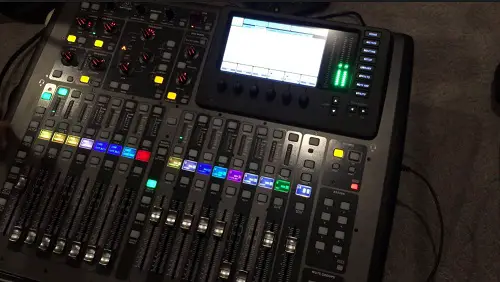
83)Doing sound for a conference
Doing tech for a church conference is a bit more involved than just doing sound for Sunday worship. First of all you can’t do it all on your own, you will need a team even if it is a small one. You will also need accurately information about the conference schedule, speakers, music and which talks will take place in which rooms. If you have a number of breakout rooms, how will you run sound simultaneausly across different venues? Will you be required to record every sessions? Maybe you could use a combination of recording through the desk for main sessions and handheld recorders for breakout sessions. Plan carefully with your team before any kind of events like this.
84)Learn to use compression
Most sound guys I know have been thrown in the deep end, given some very basic training and left to it. So many will not perhaps have ventured into using the more advanced features of their mixing console, such as compression. However, compression can enhance the sound in certain circumstances, especially for instruments where there is a large dynamic range and also for human voice. It prevents loud sound being too loud and soft sound being too quiet. It can be very effective on instruments such as bass guitar and electric guitar. Learn how to use it and experiment a bit and figure out when you have too much compression and when to turn it down. Read more about using compression.
85)Working with kids in church
Some churches encourage the kids to be in church for the first half of the worship service. This can be a great if sometimes challenging opportunity for the sound team. If children are participating in some way, either reading, speaking or singing, how do you make sure they can be heard. Too often I have seen kids taking part, but you can’t hear what they are saying. Maybe ask them to take part in a quick sound check before you start. Sometimes having an adult with a roving radio mic can work well in these situations.
86)Rent out used gear
Do you have gear sitting about not being used or in storage? Why not rent it out or lend it to another church? Why have gear lying around taking up useful space when another church could be using it?
87)Run training for other churches
I spoke about providing training for your team earlier, but if you are doing traning, why not invite people from neighbouring churches to attend or if you have a sizable AV ministry, maybe take your training to another church.
88)Tech and worship team fellowship
Churches have so many activities throughout the year and as a team, you will be very busy also. It’s not always easy to share fellowship with your colleagues when you have a job to do. It could be very benficial then to meet together informally for fellowship at different times of the year and maybe combine with the worship team and musicians. Meet at someones house, share some food together or arrange to go out for a meal.
89)A powered USB hub will always be useful
It’s amazing how many gadgets use USB these days for charging etc. On the sound desk at my home church, I have a powered USB hub which has proven invaluable. It can be used for charging phones and other items, and if it is attached to a laptop can be used for audio interfaces, desk lights and will have many other uses.
90)Have a plan B when it all goes belly-up
What do you do when everything goes wrong that can go wrong with the audio in a church service? Whatever your worse case scenario might be, you need to prepare for it, whether it’s power outages, equipment blowing a fuse, crackly mixer channels or whatever it might be. You can never plan for every eventuality, but you should always have some kind of back up plan ready.
91)Worship playlists before service starts
Some churches have the organist/pianist play before worship or if you have a band they may play some music before the service starts. Alternatively, you could have a music playlist you could use before worship that plays through a laptop or an ipod. Just check with the church leadership first that they are ok with this and what kind of music would be helpful.
92)Keep up to date with the latest tech
Thankfully audio tech doesn’t go out of date as quickly as some other technologies. However, it is still worth keeping up to date with the latest innovations in audio gear. Try and read some of the top magazines or blogs to keep you informed on the latest news.
93)Plan for an annual maintenance week
It can be hard finding time to do some major maintenance on your system, but it might be a good idea to plan a week where you and your team can give some extra time to do some maintenance. It might involved checking all your connections and cables, possibly doing some PAT testing etc.
94)How to remember settings on an analogue mixer
Remembering all the settings on an analogue mixer can be quite challenging, especially on a large console. There is only so much information you can cram into some masking tape along the bottom of your channel volume sliders. I’ll give you a little tip about what I do. I take a photograph of the mixer with my iPad, which means when I go back to find out what the setting are for a particular mix, all I have to do is check with my iPad.
95)Make sure microphone stands are all tightened up
If there’s one thing that annoys me, it’s wobbly mic stands. You go to start singing, make a small adjustment to the microphone, only to discover that it hasn’t been tightened and wobbling all over the place. When doing your sound check, make sure all the microphone stands are set at a decent height and are tightened up.

96)Use a roving wireless microphone for Q/A sessions
Some churches use their sanctuary for congregational meetings or others maybe have a Q&A session at the end of a service or a conference session. This is where a roving wireless microphone can com in very useful indeed. Invest in one, you will almost certainly use it.
97)Use a soundcheck checklist
If you have anumber of folks on your team, it is worth while using a checklist when doing your sound check. It is so easy to miss things, and having a formal checklist is a great way of making sure that no matter who is on team on a particular day, they will be following the same sound check procedure.
98)What to do when gear gets wet after a roof leak
If you happen to discover that the church building has a leak in the roof and your equipment has gotten wet, whatever you do, don’t turn it on. Remove the power leads from all affected equipment, open up the chassis, wipe away any obvious water, let the equipment dry out over a couple of days and only when it has completely dried out, turn on the power and see how it is.
99)Working with guest musicians
It can be rewarding but also challenging working with guest musicians. They may choose to bring some of their own gear with them to use such as microphones, DI boxes and amps. If they are just with you for the day, it probably won’t be possible to have a full rehearsal, but try and make good use of the time you have to do the soundcheck to make sure they are happy and you are happy with all the arrangements.
100)Working with the video team
If you have a separate team taking responsibility for all the video(i.e. laptops, data projection, video recording), you will need to work hand in hand. All the video will require audio processing of some kind, so make sure you are aware of what they are planning each Sunday and what equipment they plan to run video and audio from. Involve them when you are sound checking any video clips etc.
101)Quality, Quality, Quality
Congratulations! You have done well, getting to idea number 101! And this one applies to practically every mentioned above. Whatever kind of sound gear you purchase, make sure it is quality. Most problems encountered with live sound systems is to do with using poor quality equipment. From your microphones to your mixer and all your cabling, always buy quality. You won’t regret it.
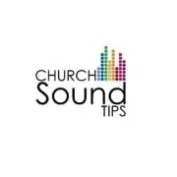
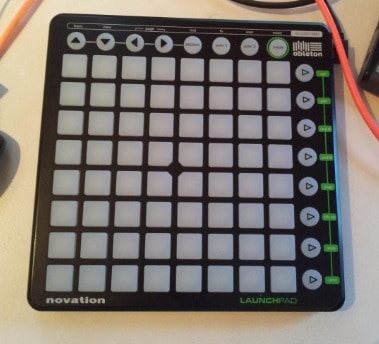
Leave a Reply